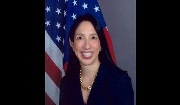WASHINGTON (AP) — The nominee to be the next U.S. ambassador to Sri Lanka says human rights will be at the top of her agenda. Michele Sison said Wednesday that serious allegations of violation of international human rights law committed during the island nation’s civil war have yet to be investigated and have slowed reconciliation.
“One cannot have true reconciliation,” Sison told her Senate confirmation hearing, “without that accountability.”
Sri Lanka’s quarter-century civil war killed more than 80,000 people. It ended in May 2009, when government forces crushed the rebels who had fought for a separate state for ethnic minority Tamils, claiming decades of discrimination by the Sinhalese majority.
The island is now at peace, but reports of rights violations persist and the government of President Mahinda Rajapaksa is under international pressure to probe abuses by both sides in the final months of the war. A U.N. report found that thousands died and that Sri Lankan troops deliberately targeted civilians. It said Tamil rebels used civilians as human shields.
Democrat Sen. Robert Casey urged an independent investigation into alleged war crimes, saying the issue would not go away “until the world sees results.”
He said Sri Lanka has yet to implement recommendations made six months ago by its own reconciliation commission, and cited figures from the Switzerland-based Internal Displacement Monitoring Center, that nearly 100,000 Tamils are still displaced. He said the military presence in the island’s north and east was obstructing their resettlement.
Sison said the U.S. was looking for “near term progress” by Sri Lanka, particularly in setting a date for provincial elections in the country’s north and demilitarization of former conflict zones.
Sri Lanka has resisted calls from human rights groups to allow an international probe into the war crimes allegations.
Sison has served as ambassador to Lebanon and the United Arab Emirates. She is currently assistant chief of mission for law enforcement and rule of law at the U.S. Embassy in Baghdad.
By MATTHEW PENNINGTON, Associated Press
